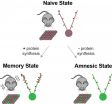(Press-News.org) Life-threatening liver inflammation can be caused by excess alcohol, fatty foods, toxins, as well as viral, bacterial, and parasite infections. A study published on May 28th in PLOS Pathogens reports that a specific immune cell type in the liver can dampen the immune response, reduce inflammation, and protect against liver damage.
Alain Beschin, from the Vrije Universiteit Brussel, Belgium, and colleagues studied the immune response to trypanosome parasites in mice, where they frequently cause liver inflammation and failure. They focused on the role of monocytes, immune cells that normally pass along the blood vessels and in response to a local infection move quickly into the affected organ and contribute to the localized immune defense there.
Monocytes come in two different "flavors", those positive for a specific cell surface marker, or Ly6C-positive monocytes, and those lacking the Ly6C marker, or Ly6C-negative monocytes. What the researchers found was that, after they infected mice with trypanosomes (which accumulate in the liver), initially mostly Ly6C-positive monocytes and subsequently also Ly6C-negative monocytes subset moved into the liver. However, whereas the Ly6C-positive subset promoted inflammation through release of the pro-inflammatory factor TNF and initiated wide-spread liver injury, the Ly6C-negative monocyte subset suppressed inflammation and prevented progression of liver disease.
The researchers went on to show that the Ly6C-negative monocytes protected the liver in two distinct ways. On one hand, they released a molecule called IL-10 which dampens the immune response, and on the other they made direct contact with the inflammation-promoting Ly6C-positive monocytes, which induced a change in these cells, forcing them to differentiate into so-called macrophages (a related immune cell) and turn on anti-inflammatory genes.
Regarding possible therapeutic implications, the researchers suggest that "augmenting Ly6C-negative monocyte accumulation or functionality may represent a useful intervention strategy complementing anti-infective medication in conditions of liver injury due to chronic infections."
INFORMATION:
Please use this URL to provide readers access to the paper (Link goes live upon article publication):
http://dx.plos.org/10.1371/journal.ppat.1004873
Authors and Affiliations:
Yannick Morias, Vlaams Instituut voor Biotechnologie (VIB), Belgium; Vrije Universiteit Brussel (VUB), Belgium
Chloé Abels, Vlaams Instituut voor Biotechnologie (VIB), Belgium; Vrije Universiteit Brussel (VUB), Belgium
Damya Laoui, Vlaams Instituut voor Biotechnologie (VIB), Belgium; Vrije Universiteit Brussel (VUB), Belgium
Eva Van Overmeire, Vlaams Instituut voor Biotechnologie (VIB), Belgium; Vrije Universiteit Brussel (VUB), Belgium
Martin Guilliams, Vlaams Instituut voor Biotechnologie (VIB), Belgium; University Gent, Belgium
Elio Schouppe, Vlaams Instituut voor Biotechnologie (VIB), Belgium; Vrije Universiteit Brussel (VUB), Belgium
Frank Tacke, Rheinisch-Westfaelische Technische Hochschule (RWTH) University Hospital Aachen, Germany
Carlie J. deVries, University of Amsterdam, The Netherlands
Patrick De Baetselier, Vlaams Instituut voor Biotechnologie (VIB), Belgium; Vrije Universiteit Brussel (VUB), Belgium
Alain Beschin, Vlaams Instituut voor Biotechnologie (VIB), Belgium; Vrije Universiteit Brussel (VUB), Belgium
Please contact plospathogens@plos.org if you would like more information.
Funding: The work was supported by the "Interuniversity Attraction Poles Programme"-Belgian Science Policy (http://www.belspo.be)(P7/41). YM and DL are funded by the "Agentschap voor Innovatie door Wetenschap en Technologie" (IWT-Vlaanderen, http://www.iwt.be). CA, EVO, and ES are funded by "Fonds Wetenschappelijk Onderzoek-Vlaanderen" (FWO, http://www.fwo.be).The funders had no role in study design, data collection and analysis, decision to publish, or preparation of the manuscript.
Competing Interests: The authors have declared that no competing interests exist.
Citation: Morias Y, Abels C, Laoui D, Van Overmeire E, Guilliams M, Schouppe E, et al. (2015) Ly6CMonocytes Regulate Parasite-Induced Liver Inflammation by Inducing the Differentiation of Pathogenic Ly6C+ Monocytes into Macrophages. PLoS Pathog 11(5): e1004873. doi:10.1371/journal.ppat.1004873
The human sensory systems contend with enormous diversity in the natural world. But it has been known for a long time the brain is adapted to exploit statistical regularities that nonetheless arise amongst this diversity. Research publishing this week in PLOS Computational Biology reports that established statistical distributions of visual features, such as visual contrast, spatial scale and depth, differ between dark and bright components of the natural world.
For scientists Emily Cooper and Anthony Norcia, gaining a more detailed description of statistical regularities ...
Retrograde amnesia is the inability to recall established memories. In humans, amnesia is associated with traumatic brain injury, Alzheimer's disease, and other neurological conditions. Whether memories lost to amnesia are completely erased or merely unable to be recalled remains an open question. Now, in a finding that casts new light on the nature of memory, published in Science, researchers from the RIKEN-MIT Center for Neural Circuit Genetics demonstrated in mice that traces of old memories do remain in the amnestic brain, and that the cellular pathways underlying them ...
Elevated plasma triglyceride level is considered a risk factor for type-2 diabetes, but new findings suggest that a genetically-elevated triglyceride level is associated with protection against type-2 diabetes. Yann Klimentidis, an Assistant Professor at the Mel and Enid Zuckerman College of Public Health at the University of Arizona, and colleagues found that triglyceride-increasing alleles are associated with decreased type-2 diabetes incidence. Their findings were published recently in PLOS Genetics.
Building on previous studies that hinted to the same association, ...
Dany Gaillard and colleagues at the University of Colorado Anschutz Medical Campus have discovered a key molecular pathway that aids the renewal of taste buds, a finding that may help cancer patients suffering from an altered sense of taste during treatment. Their findings were published recently in the journal PLOS Genetics.
"Many cancer drugs which circulate throughout the entire body, will target a tumor but in the process affect healthy cells," said the study's senior author Linda Barlow, a professor of cell and developmental biology at University of Colorado Anschutz ...
AURORA, Colo. (May 28, 2015) - Researchers at the University of Colorado Anschutz Medical Campus have discovered a key molecular pathway that aids in the renewal of taste buds, a finding that may help cancer patients suffering from an altered sense of taste during treatment.
"Many cancer drugs, which circulate throughout the entire body, will target a tumor but in the process affect healthy cells," said the study's senior author Linda Barlow, PhD, professor of cell and developmental biology at CU Anschutz. "That in turn will alter a person's sense of taste leading to ...
CAMBRIDGE, MA -- Memories that have been "lost" as a result of amnesia can be recalled by activating brain cells with light.
In a paper published today in the journal Science, researchers at MIT reveal that they were able to reactivate memories that could not otherwise be retrieved, using a technology known as optogenetics.
The finding answers a fiercely debated question in neuroscience as to the nature of amnesia, according to Susumu Tonegawa, the Picower Professor in MIT's Department of Biology and director of the RIKEN-MIT Center at the Picower Institute for Learning ...
This news release is available in Japanese.
Long-held social biases can be reduced during sleep, a new report suggests. It adds further support to recent research that has shown that memories can be selectively reactivated and strengthened during slumber. Scientists have known that sleep boosts memory formation by resuscitating faint neuron activity shaped during earlier periods, when an individual was awake. This process can be experimentally stimulated by giving a sleeping individual cues related to an earlier period of learning. Now, Xiaoqing Hu and colleagues ...
This news release is available in Japanese. Xiaochun Qin and colleagues have provided a high-resolution crystal structure of a plant protein supercomplex critical to photosynthesis, shedding new light on how this extremely effective solar energy converter achieves its impressive performance. The photosynthesis of many plants relies upon the large light-harvesting complex I (LHC1), which surrounds photosystem I (PSI) and captures sunlight. LHC1 is able to transfer the energy it absorbs to the PSI core, where it is converted into chemical energy with close to 100% efficiency. ...
This news release is available in Japanese.
Memories that have been destabilized and forgotten by mice can nevertheless be retrieved by activating memory engrams, or specific patterns of neurons that fire when memories are encoded, with light, researchers say. These findings provide fresh insight into memory consolidation, or the process by which new, unstable memories transform into stable, long-term memories. Until now, researchers have wondered whether memory consolidation was dependent upon the stabilization of these memory engrams. But Tomás Ryan and colleagues ...
This news release is available in Japanese.
Armadas of icebergs that broke off the Greenland ice sheet into the northern Atlantic Ocean during the Last Glacial Period -- between about 110,000 and 12,000 years ago -- often increased methane production in the tropics, according to a new study. These findings illustrate how high-latitude events can influence tropical climate conditions, and they hint at the underlying mechanisms of abrupt climate changes. Such massive discharges of icebergs into the Atlantic are known as Heinrich Events, and researchers have wondered for ...


